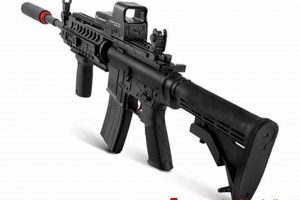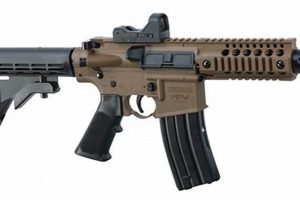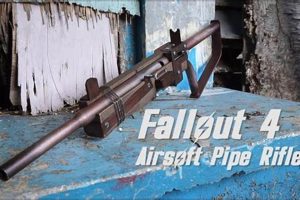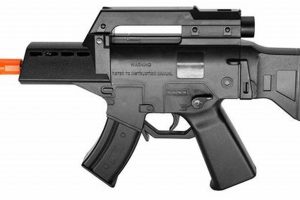The query regarding the availability of airsoft guns at Walmart is a common one among consumers interested in purchasing these recreational items. Airsoft guns are replica firearms that fire plastic pellets, designed primarily for recreational use in simulated combat scenarios or target shooting. Their sale and distribution are subject to certain regulations and retailer policies.
Understanding which retailers carry airsoft guns is important for individuals seeking to purchase them locally. The availability of these items at large retailers affects consumer accessibility and the overall market for airsoft equipment. Historical context indicates varying policies across retailers regarding the sale of items resembling firearms, often influenced by legal considerations and public perception.
This exploration will delve into the specific retail policies of Walmart concerning the sale of airsoft guns, considering factors that influence their decision-making process and offering alternative purchasing options for interested parties. It will also address common misconceptions and provide clarity on the accessibility of airsoft-related products.
Acquiring airsoft guns requires awareness of retailer policies and legal considerations. The following tips provide guidance for a smooth and informed purchasing experience.
Tip 1: Verify Local Laws: Before attempting to purchase any airsoft gun, research and confirm the local and state laws concerning ownership, transportation, and use. Regulations vary significantly by location.
Tip 2: Check Retailer Policies: Retailers have independent policies regarding the sale of airsoft guns. Contact the retailer directly or consult their website to understand their specific requirements, such as age restrictions or identification verification.
Tip 3: Consider Specialized Retailers: If a desired model is unavailable at general merchandise stores, explore specialty airsoft retailers. These stores typically offer a wider selection, knowledgeable staff, and expert advice.
Tip 4: Review Product Specifications: Carefully examine the specifications of any airsoft gun before purchase, paying attention to factors such as velocity (measured in feet per second or FPS), material, and intended use. Ensure the product aligns with the intended application and complies with safety regulations.
Tip 5: Invest in Safety Gear: Airsoft activities necessitate the use of appropriate safety gear, including eye protection (ANSI-rated goggles or masks) and face protection. This is non-negotiable, regardless of location.
Tip 6: Understand Safe Handling Practices: Familiarize oneself with safe handling practices for airsoft guns. Treat them as one would a real firearm, emphasizing muzzle awareness and responsible storage.
Tip 7: Be Aware of Public Perception: Exercise caution when transporting or displaying airsoft guns in public. Their realistic appearance can cause alarm. Use appropriate cases or bags to conceal them and avoid brandishing them in public areas.
Following these recommendations improves the likelihood of a successful and responsible airsoft gun acquisition. Responsible ownership contributes to the safety and enjoyment of the airsoft hobby.
The next section will provide alternative resources for finding a reliable supplier of airsoft products, in case the initial search proves unfruitful.
1. Retailer Policy
Retailer policy serves as the foundational determinant regarding the availability of airsoft guns at Walmart. This policy reflects a complex interplay of legal considerations, corporate social responsibility initiatives, and risk management assessments. The decision of whether or not to stock airsoft guns hinges directly on Walmart’s internal guidelines concerning products that resemble firearms. These guidelines are not static; they evolve in response to changes in legislation, public perception, and incidents involving similar products. For example, heightened concerns about gun violence could prompt a review of Walmart’s existing policy, potentially leading to the restriction or complete removal of airsoft guns from their shelves.
The specific criteria within Walmart’s retailer policy might include stipulations about the required markings on airsoft guns to differentiate them from actual firearms, age verification procedures for purchasers, and geographical restrictions based on local ordinances. Instances where Walmart has chosen not to stock certain types of airsoft guns due to their excessive realism or lack of mandatory safety features exemplify the direct impact of retailer policy on product availability. Conversely, a retailer policy focused on offering a wide range of recreational products might lead to the inclusion of lower-powered, clearly identifiable airsoft guns in specific markets. The implementation of a comprehensive customer education program about the safe handling and responsible use of airsoft guns might also influence Walmart’s decision to stock these products.
In summary, Walmart’s retailer policy functions as the gatekeeper for the sale of airsoft guns. Understanding this policy is crucial for comprehending the variability in product availability across different stores and regions. The interplay of legal compliance, risk mitigation, and corporate responsibility ultimately shapes whether a consumer can find airsoft guns at a particular Walmart location. Scrutinizing retailer policy provides insights into the complex factors governing product availability, highlighting the significance of these internal guidelines.
2. Local Regulations
Local regulations significantly influence whether Walmart stocks airsoft guns. Municipal and state laws regarding imitation firearms directly affect the retailer’s ability to offer these products in specific geographic areas. Compliance with these regulations is a primary concern for Walmart, impacting distribution strategies and product availability.
- Age Restrictions
Many localities impose age restrictions on the purchase and possession of airsoft guns. Walmart must adhere to these age limits, potentially requiring age verification at the point of sale. If local laws mandate a higher age requirement than Walmart’s general policy, the stricter regulation prevails, thus affecting product availability for certain demographics. For instance, a city ordinance requiring individuals to be 21 years or older to purchase airsoft guns will prevent Walmart from selling them to younger individuals, regardless of state laws.
- Markings and Identification
Local regulations often stipulate specific markings or colorations for airsoft guns to differentiate them from real firearms. These markings may include orange tips, brightly colored bodies, or unique serial numbers. Walmart must ensure that any airsoft guns sold comply with these marking requirements. Failure to comply can result in legal penalties, prompting Walmart to restrict sales or modify the products to meet local standards. Some municipalities may ban airsoft guns that lack specific markings, thereby precluding Walmart from selling non-compliant models.
- Transportation and Use Restrictions
Regulations governing the transportation and use of airsoft guns vary widely by locality. Some areas prohibit the open carry of airsoft guns or restrict their use to designated areas, such as private property or regulated airsoft fields. Walmart’s decision to sell airsoft guns in a particular location may be influenced by the prevalence of these restrictions, as stricter laws can decrease consumer demand and increase the risk of legal issues. A city ordinance banning the use of airsoft guns in public parks, for example, might reduce Walmart’s incentive to stock them in local stores.
- Licensing and Registration
Some jurisdictions require individuals to obtain a license or register their airsoft guns with local authorities. These requirements add complexity to the purchasing process and may deter Walmart from selling airsoft guns in these areas. The administrative burden of ensuring compliance with licensing and registration laws can outweigh the potential profit from sales. In a city mandating registration, Walmart might choose not to sell airsoft guns rather than navigate the complexities of verifying customer compliance.
The multifaceted nature of local regulations demonstrates a direct influence on whether Walmart offers airsoft guns for sale in a given market. By adhering to these variable laws, Walmart ensures compliance and mitigates potential risks, ultimately shaping product availability for consumers seeking these recreational items. The retailer’s adherence to local ordinances demonstrates how legal compliance fundamentally affects the accessibility of airsoft guns to prospective buyers.
3. Product Classification
The categorization of airsoft guns significantly impacts their availability at Walmart. If classified as toys, these items might be subject to less stringent regulations and readily stocked. Conversely, classification as imitation firearms brings heightened scrutiny, leading to potential restrictions or outright bans depending on local laws and internal risk assessments. Walmart’s decision to sell airsoft guns directly correlates with how they are legally and internally classified. An example is the distinction between low-powered spring airsoft guns, often deemed toys, and higher-powered electric or gas-powered models, frequently treated as regulated items. This differentiation influences stocking decisions across various Walmart locations.
The accuracy and consistency of product classification are crucial for compliance. Misclassification, whether intentional or unintentional, can result in legal repercussions and reputational damage for the retailer. Walmart invests resources in ensuring correct classification through collaboration with legal experts and adherence to industry standards. Furthermore, product classification dictates storage and display requirements within stores. Items classified as higher-risk necessitate secure display cases and restricted access, while those deemed toys may be displayed more openly. Accurate classification mitigates risk and ensures compliance with various federal, state, and local laws.
In summary, product classification forms a foundational element in determining whether Walmart stocks airsoft guns. The retailer’s decision-making process hinges on the legal and internal classification of these items, influencing product availability, compliance measures, and overall risk management strategies. Challenges arise in maintaining consistent classification across diverse jurisdictions with varying regulations, necessitating ongoing diligence and adaptation. The classification process directly affects consumer access to these recreational items.
4. Age Restrictions
Age restrictions represent a critical factor in the determination of whether Walmart stocks airsoft guns. These limitations are imposed to ensure responsible use and to mitigate potential safety risks associated with these products. The presence and enforcement of age restrictions significantly influence Walmart’s decision-making process regarding the sale of airsoft guns.
- Legal Compliance
Federal, state, and local laws often stipulate minimum age requirements for purchasing airsoft guns. Walmart is legally obligated to adhere to these regulations. The specific age threshold varies by jurisdiction, with some areas setting the minimum age at 18 while others may require purchasers to be 21. Failure to comply with these age restrictions can result in substantial penalties, including fines and the revocation of sales privileges. Walmart must implement robust age verification procedures to ensure adherence to legal requirements. This involves training employees to accurately identify valid forms of identification and to refuse sales to individuals who do not meet the minimum age requirement.
- Walmart’s Internal Policy
Beyond legal mandates, Walmart may establish its own internal policies regarding age restrictions for airsoft gun purchases. These internal policies may be stricter than the minimum legal requirements in certain jurisdictions. Walmart’s internal age restrictions are influenced by factors such as corporate social responsibility, risk management considerations, and public perception. The retailer may impose additional requirements, such as parental consent forms or restrictions on the types of airsoft guns that can be sold to younger individuals. These internal policies serve as an added layer of protection and help to ensure responsible sales practices. For instance, while the legal age to purchase an airsoft gun in a particular state might be 18, Walmart could internally set the age at 21, or require anyone under 18 to be accompanied by a parent or guardian.
- Enforcement Mechanisms
The effectiveness of age restrictions hinges on the implementation of robust enforcement mechanisms. Walmart employs various strategies to verify the age of potential purchasers, including requiring photo identification at the point of sale, using electronic age verification systems, and conducting sting operations to identify employees who may be violating age restriction policies. These enforcement mechanisms are crucial for deterring underage individuals from attempting to purchase airsoft guns and for ensuring compliance with legal and internal requirements. Regular training for employees is also essential to reinforce the importance of age verification and to equip them with the skills necessary to accurately assess identification documents and to identify potential signs of fraudulent activity.
- Impact on Product Availability
Age restrictions directly impact the types of airsoft guns that Walmart chooses to stock. The retailer may opt to limit the selection of higher-powered or more realistic-looking airsoft guns to older purchasers, while offering a wider range of lower-powered, less realistic models to younger individuals. This approach allows Walmart to cater to different age groups while mitigating potential risks associated with more powerful airsoft guns. Additionally, age restrictions can influence the geographical availability of airsoft guns. In areas with stricter age restrictions, Walmart may choose not to stock airsoft guns at all, or to limit their availability to select stores with enhanced age verification procedures.
In conclusion, age restrictions play a pivotal role in Walmart’s decision regarding the sale of airsoft guns. These limitations are driven by legal compliance, internal risk management policies, and a commitment to responsible sales practices. The enforcement of age restrictions directly affects product availability and the types of airsoft guns that Walmart chooses to offer to different age groups, shaping the overall landscape of airsoft gun sales at the retail giant. Scrutinizing age restrictions reveals the significance of responsible sales practices, and helps illustrate the complex elements that affect the likelihood of finding airsoft guns at any particular retail location.
5. Alternative Retailers
The availability of airsoft guns at Walmart, or the lack thereof, directly influences the consumer’s need to explore alternative retailers. If Walmart’s policy, local regulations, product classification, or age restrictions prevent the sale of airsoft guns at its stores, customers seeking these items must turn to specialized vendors. These alternative retailers often include dedicated airsoft stores, sporting goods outlets, and online marketplaces specializing in recreational firearms. The reliance on these alternatives underscores the cause-and-effect relationship between Walmart’s inventory decisions and consumer purchasing behavior. The importance of alternative retailers is heightened in regions where Walmart’s offerings are limited or nonexistent, ensuring that enthusiasts can still access desired products and equipment. A real-life example includes individuals in states with stringent airsoft gun regulations, who must order online from retailers that comply with these state-specific requirements, demonstrating the practical significance of identifying and utilizing these channels.
Alternative retailers also offer benefits beyond mere product availability. They frequently provide a wider selection of airsoft guns, accessories, and tactical gear compared to general merchandise stores like Walmart. This expanded inventory caters to experienced players and those seeking specific models or customizations. Furthermore, specialized retailers typically employ knowledgeable staff who can offer expert advice on product selection, maintenance, and safe usage practices. This enhanced customer service contributes to a more informed purchasing decision and a safer airsoft experience. Many alternative retailers also host or sponsor local airsoft events and communities, fostering a sense of camaraderie among enthusiasts. For instance, a local airsoft store might host a weekly skirmish or offer tech services to repair and upgrade airsoft guns, which enhances the appeal for dedicated players.
In conclusion, the search for alternative retailers is intrinsically linked to Walmart’s role in the airsoft market. When Walmart does not offer airsoft guns, or provides a limited selection, alternative retailers become essential for consumers. These specialized vendors offer a wider range of products, expert advice, and community support. A challenge for consumers is verifying the legitimacy and reliability of online airsoft retailers, ensuring compliance with local laws, and understanding return policies. Overall, the landscape of airsoft gun sales is heavily influenced by the interaction between general retailers like Walmart and the diverse network of alternative options, emphasizing the consumer’s need to navigate this landscape effectively.
Frequently Asked Questions
This section addresses common inquiries regarding the sale of airsoft guns at Walmart, providing factual and unbiased information.
Question 1: Does Walmart generally stock airsoft guns in its stores?
The availability of airsoft guns at Walmart varies depending on factors such as local regulations, store location, and internal company policies. There is no uniform policy across all Walmart stores; some locations may stock airsoft guns while others do not.
Question 2: What factors influence Walmart’s decision to sell airsoft guns in a particular location?
Local and state laws pertaining to imitation firearms are primary determinants. Age restrictions, required markings (e.g., orange tips), and regulations regarding transportation and use significantly impact whether Walmart chooses to stock airsoft guns in a specific market. Internal risk assessments and corporate social responsibility initiatives also play a role.
Question 3: Are there age restrictions for purchasing airsoft guns at Walmart?
Walmart adheres to all applicable age restrictions for airsoft gun sales. These age restrictions are determined by local, state, and federal laws. Store personnel are typically required to verify the purchaser’s age with valid identification.
Question 4: If Walmart does not sell airsoft guns, what are alternative retail options?
Specialized airsoft retailers, sporting goods stores, and online marketplaces represent viable alternatives. These vendors typically offer a wider selection, expert advice, and may be subject to different regulatory constraints than general merchandise retailers.
Question 5: How can one determine if a specific Walmart store sells airsoft guns?
The most reliable method is to contact the store directly via phone or visit its website, if available, to inquire about their inventory. Online searches may also provide information, but direct confirmation from the store is recommended.
Question 6: What should be considered before purchasing an airsoft gun, regardless of the retailer?
Individuals should familiarize themselves with local laws and regulations regarding airsoft gun ownership, transportation, and use. Investing in appropriate safety gear, such as eye protection, and understanding safe handling practices are essential.
In summary, the availability of airsoft guns at Walmart is subject to various external and internal factors, necessitating careful consideration of local laws and alternative retail options.
The next section will provide an overview of the legal considerations surrounding airsoft guns.
The exploration of whether Walmart stocks airsoft guns reveals a complex interplay of retail policies, local regulations, product classifications, and age restrictions. The availability of these items is not uniform across all stores, necessitating that consumers independently verify the presence of airsoft guns at specific locations. Alternative retailers, including specialty airsoft stores and online vendors, serve as critical resources when Walmart’s offerings are limited. The analysis highlights the need for prospective buyers to conduct thorough research prior to attempting a purchase.
The responsible ownership and use of airsoft guns remain paramount. Individuals should diligently adhere to local laws, prioritize safety through appropriate protective gear, and exercise caution when handling and transporting these items. Understanding the multifaceted factors influencing the availability of airsoft guns at major retailers like Walmart contributes to informed consumer choices and promotes responsible engagement with the airsoft hobby. Continued diligence in this area is vital to maintaining a safe and regulated recreational environment.


![Shop the Best Grease Gun Airsoft Guns | [Brand] Safem Fabrication - Precision Engineering & Custom Manufacturing Solutions Shop the Best Grease Gun Airsoft Guns | [Brand] | Safem Fabrication - Precision Engineering & Custom Manufacturing Solutions](https://airsoftica.com/wp-content/uploads/2025/06/th-4322-300x200.jpg)




